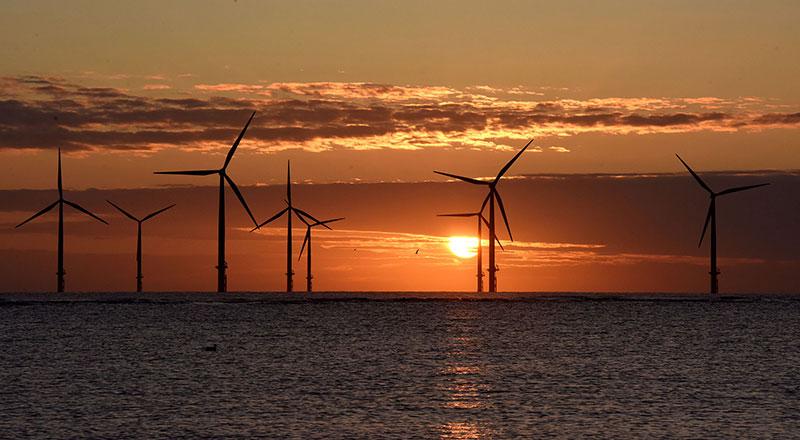How can Ghana’s SMEs tackle climate change?
Global climate change resulting from carbon (CO2) emissions is currently a top concern for businesses, governments, and other stakeholders.

Over the past two decades, climate change has also received increasing attention from academics, professionals, regulators and environmental activists and has assumed a leading spot in business, political, and economic agenda. However, most previous research has focussed on CO2 emissions of big-sized firm of Europe, United States, and China, while overlooking small and medium enterprises (SMEs) of other regions such as Africa.
A team of researchers from Teesside University International Business School (TUIBS) has attempted to fill this void in the literature by considering SMEs of a significant region, Greater Accra, Ghana, West Africa. In Ghana, SMEs play a significant role in the economy, accounting for about 60% of the nation's GDP and about 80% of all employment in Ghana. However, SMEs are also a major sources of CO2 emissions. Yet, despite their crucial role in the economy, SMEs have not previously featured prominently in public policy discourses on the CO2 emission reduction agenda with regard to the sector's potential to contribute to drive down CO2 emissions. Considering the CO2 emissions of SMEs in policy discourses is pertinent because about 60% of all CO2 emissions and 70% of global pollution are attributed to SMEs.
The project sought to examine the challenges faced by Ghanaian SMEs in reducing their carbon emissions, the level of awareness of energy efficiency and carbon emission reduction in SME operations, the behaviours affecting energy use amongst SMEs, the measures that can help SMEs reduce their energy consumption, and how domestic policymaking in the Ghana can encourage and help SMEs to limit their contribution to carbon emissions. The researchers investigated entrepreneurial energy efficiency orientation in the context of carbon emission reduction initiatives of SMEs. The study enhanced the understanding of climate change action of SMEs by uncovering the channel of identifying barriers to green practices through which an SME’s entrepreneurial energy efficiency orientation could drive superior carbon emission reduction initiatives.
The researchers gathered responses from owners/managers/supervisors of SMEs in Greater Accra region, Ghana, through questionnaires. After analysing this dataset, the researchers found that:
- Ghanaian SMEs' entrepreneurial energy efficiency orientation can enhance identification of green barriers, green planning, green networking and the selection of green innovation approaches.
- Identifying barriers to green practices, green planning, green networking and the selection of green innovation approaches can help Ghanaian SMEs reduce CO2 emissions.
- Identifying barriers to green practices serves as a channel through which Ghanaian SMEs’ entrepreneurial energy efficiency orientation can reduce CO2 emission. A possible explanation of this channel is that Ghanaian SMEs, through identifying barriers to green practices, may engage in CO2 emission reduction initiatives as a credible means of improving operational efficiency, reducing costs, and ultimately lowering CO2 emissions.
Based on their findings, this research offers the following recommendations to the Ghana government, the National Board of Small Scale Industries (NBSSI), Ministry of Business Development (MBD), and policymakers.
Sustainability training
To promote green SME initiatives and to set the ‘tone at the top’, the founders/owners, senior managers, supervisors, and other strategic level managers (e.g., operation managers) of SMEs must be encouraged to attend training and workshops on energy efficiency and sustainable business operations.
Develop capabilities
Given that identifying barriers to green practices could channel the Ghanaian SMEs’ entrepreneurial energy efficiency orientation towards CO2 emissions, the MBD and NBSSI should consider developing SMEs’ capabilities to identify such barriers. The capabilities may be developed through training and workshops.
Information Sharing Platform
The capabilities developed above can then be shared via a website, an app, or any other platform for discussing energy efficiency issues. The MBD should develop such a platform for sharing SME energy efficiency developments. This platform can also be used to share success stories of SMEs regarding energy efficiently and CO2 reduction.
Promote carbon reporting
The MBD, in collaboration with academic institutions (such as the University of Ghana), to start a consultation on setting up training and certification courses for SME owners and managers in carbon reporting (e.g. carbon capture) and energy consumption auditing in a bid to attract and train more top-level managers on carbon footprint strategies.
Tax incentives
The government of Ghana can entice SMEs in the region to reduce their dependence on the national energy grid by giving a tax rebate to all SMEs adopting alternative sustainable/green energy sources.
Awards
The MBD, in collaboration with governance-related institutions may set up an annual Green Award Scheme for SMEs and their employees who make outstanding contributions to the green SMEs agenda in the Accra region.
Embed sustainability in education
Sustainability should be part of the educational curriculum in Ghanaian universities, colleges, and schools to ensure that academic institutions train professionals in ethical and sustainable principles.
Funding
The MBD, in collaboration with governance-related institutions should design financial packages and funding to support the greening of SMEs in the Accra region.
Awareness and understanding
The MBD, in collaboration with academic/governance-related institutions (such as the University of Ghana), to commission an in-depth study of how SMEs in the region can embed green cultural practices, manage the green transition and thereby serve as a catalyst to create green jobs in the region.
Dr. Douglas A. Adu*, Dr. Mudassar Hasan*, Dr. Liyanage S. Rodrigo*, Dr. Xihui Haviour Chen**
* Teesside University International Business School
** Edinburgh Business School, Heriot-Watt University
 Teesside University hosts groundbreaking hydrogen conference
Teesside University hosts groundbreaking hydrogen conference University supporting development of new £1m concrete plant
University supporting development of new £1m concrete plant Academic’s artwork on display at Middlesbrough station
Academic’s artwork on display at Middlesbrough station